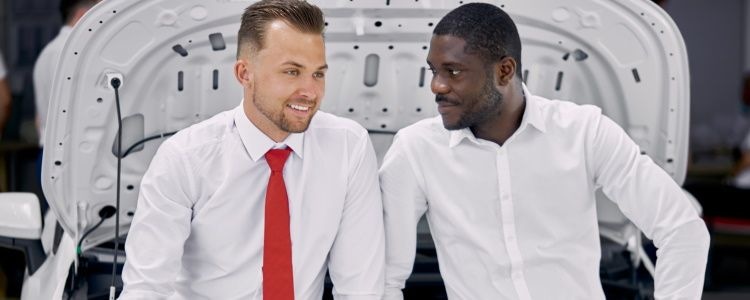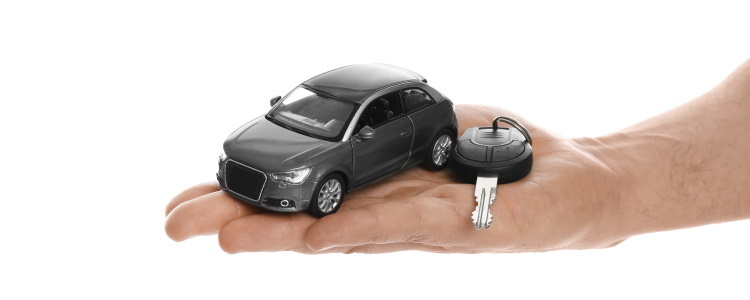A joint auto loan is when two people are equally responsible for the vehicle and loan. If that vehicle gets repossessed, it could mean a lot of headaches for both of you.
Joint Auto Loans and Vehicle Repossession
A joint car loan is when two borrowers, known as co-borrowers, share the responsibility for an auto loan and the vehicle itself. Co-borrowers are equally responsible for maintaining the vehicle, paying insurance, and making the loan payments. Both parties also have their names listed on the vehicle title as well.
Often, co-borrowers are married couples or life partners. However, just because a couple splits up and they have a joint car loan, doesn’t mean that one co-borrower is off the hook. If both names remain on the auto loan contract and vehicle title, both are responsible for the loan regardless if they’re married/together anymore. If your co-borrower has the car, but your name is still on the contract and it’s repossessed, the lender could still ask you to pay for the loan.
If the vehicle gets repossessed, both parties suffer the consequences which can include:
- Damage to credit scores
- Responsibility for any deficiency balance after auction
- Responsible for paying storage and recovery fees that accrue
- May struggle to get a car loan for around 12 months
If you and your co-borrower have an agreement where only one of you is responsible for the monthly payments, this has no effect on the loan. In a co-borrower situation, you're both responsible for everything to do with the loan and the car as far as the lender is concerned.
In other words: both co-borrowers should do everything to avoid default and repossession. Not only does it mean losing the vehicle, but it also can mean both of you can be pursued for the loan balance after a repossession.
The Damage and Headache After a Car Repo
 A repossession can cause major damage to your credit reports and lower your credit score. If your credit score has historically been great, you may experience a steeper drop in points than a borrower with so-so or poor credit.
A repossession can cause major damage to your credit reports and lower your credit score. If your credit score has historically been great, you may experience a steeper drop in points than a borrower with so-so or poor credit.
The exact amount of points you could lose after a repo varies a lot, but it could be around up to 100 points (or more!). Additionally, most lenders can’t work with borrowers that have a repossession on their credit reports that’s less than a year old. After one year, subprime lenders may be able to assist a past-repo borrower, though.
And don’t forget about a possible deficiency balance! Just because the lender recovered the car doesn’t mean you no longer owe the loan balance. Most lenders prep the repossessed vehicle for auction and the sale proceeds are applied to your remaining balance. If there's a balance left over after auction, then you’re responsible for it – that’s the deficiency balance. Any other fees such as storage fees and recovery company fees are also typically rolled into this total as well.
For co-borrowers, you're both responsible for the deficiency balance if there is one, and you both experience the damage from the repossession on your credit reports.
Removing a Co-Borrower From a Joint Auto Loan
Since co-borrower share rights to the vehicle on a joint car loan, both must agree to any changes to the loan agreement or a sale of the car. If one of you can no longer bear this responsibility, it might be better to try and remove the co-borrower from the loan rather than losing the vehicle to default.
One of the easiest ways to remove a co-borrower (or cosigner) is by refinancing the auto loan. Refinancing involves replacing the old contract with a new one. If you want to remove your co-borrower but keep the vehicle, this is a good path to explore. Keep in mind that you still need your co-borrowers permission to do so, and you must qualify for refinancing.
If refinancing isn’t an option, selling the vehicle and paying off the loan can remove both of your names from the contract and title. Most joint auto loans require both borrowers to sign off on the title, so both of you are likely to be needed at the sale.
Another option is to pay off the loan naturally through monthly installments or in a lump sum. However, unless you refinance or sell the car, both borrowers have rights to the vehicle, since paying off the loan does not remove either co-borrowers name from the title – it just ends the loan.
On to the Next Loan!
Many borrowers enlist the help of a co-borrower to help them get an auto loan. But not everyone has the resources for a joint auto loan, and some borrowers prefer to go it alone. It’s not always easy to go it alone if you have less than perfect credit so we want to extend a helping hand.
Here at Auto Credit Express, we’ve been in the business of connecting borrowers to special finance dealerships that are equipped to handle many tough credit circumstances. We’ll look for a dealer in your local area that has bad credit lending resources after you complete our quick, free auto loan request form.


















